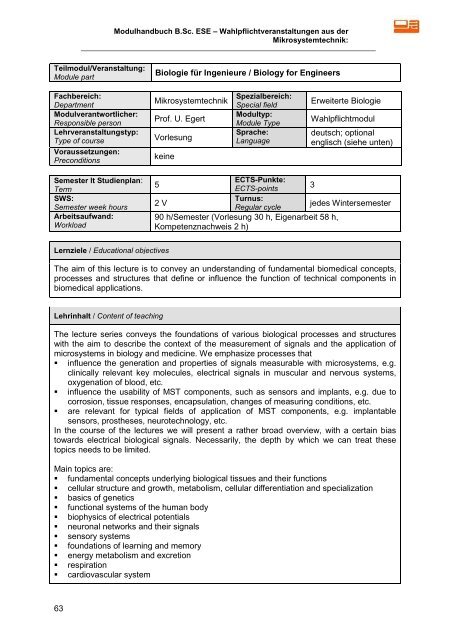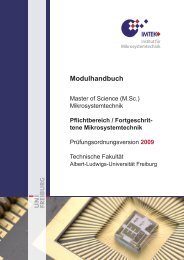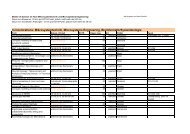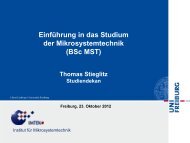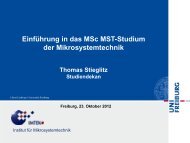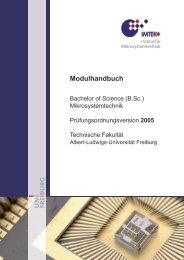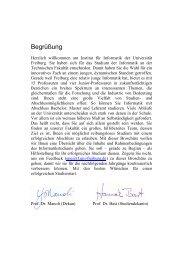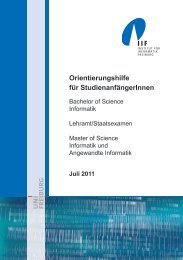Modulhandbuch - Technische Fakultät - Albert-Ludwigs-Universität ...
Modulhandbuch - Technische Fakultät - Albert-Ludwigs-Universität ...
Modulhandbuch - Technische Fakultät - Albert-Ludwigs-Universität ...
Erfolgreiche ePaper selbst erstellen
Machen Sie aus Ihren PDF Publikationen ein blätterbares Flipbook mit unserer einzigartigen Google optimierten e-Paper Software.
Teilmodul/Veranstaltung:<br />
Module part<br />
Fachbereich:<br />
Department<br />
Modulverantwortlicher:<br />
Responsible person<br />
Lehrveranstaltungstyp:<br />
Type of course<br />
Voraussetzungen:<br />
Preconditions<br />
Semester lt Studienplan:<br />
Term<br />
SWS:<br />
Semester week hours<br />
Arbeitsaufwand:<br />
Workload<br />
63<br />
<strong>Modulhandbuch</strong> B.Sc. ESE – Wahlpflichtveranstaltungen aus der<br />
Mikrosystemtechnik:<br />
Biologie für Ingenieure / Biology for Engineers<br />
Mikrosystemtechnik Spezialbereich:<br />
Special field<br />
Prof. U. Egert<br />
Modultyp:<br />
Module Type<br />
Vorlesung<br />
Sprache:<br />
Language<br />
keine<br />
Lernziele / Educational objectives<br />
Erweiterte Biologie<br />
Wahlpflichtmodul<br />
deutsch; optional<br />
englisch (siehe unten)<br />
5<br />
ECTS-Punkte:<br />
ECTS-points<br />
3<br />
2 V<br />
Turnus:<br />
Regular cycle<br />
jedes Wintersemester<br />
90 h/Semester (Vorlesung 30 h, Eigenarbeit 58 h,<br />
Kompetenznachweis 2 h)<br />
The aim of this lecture is to convey an understanding of fundamental biomedical concepts,<br />
processes and structures that define or influence the function of technical components in<br />
biomedical applications.<br />
Lehrinhalt / Content of teaching<br />
The lecture series conveys the foundations of various biological processes and structures<br />
with the aim to describe the context of the measurement of signals and the application of<br />
microsystems in biology and medicine. We emphasize processes that<br />
� influence the generation and properties of signals measurable with microsystems, e.g.<br />
clinically relevant key molecules, electrical signals in muscular and nervous systems,<br />
oxygenation of blood, etc.<br />
� influence the usability of MST components, such as sensors and implants, e.g. due to<br />
corrosion, tissue responses, encapsulation, changes of measuring conditions, etc.<br />
� are relevant for typical fields of application of MST components, e.g. implantable<br />
sensors, prostheses, neurotechnology, etc.<br />
In the course of the lectures we will present a rather broad overview, with a certain bias<br />
towards electrical biological signals. Necessarily, the depth by which we can treat these<br />
topics needs to be limited.<br />
Main topics are:<br />
� fundamental concepts underlying biological tissues and their functions<br />
� cellular structure and growth, metabolism, cellular differentiation and specialization<br />
� basics of genetics<br />
� functional systems of the human body<br />
� biophysics of electrical potentials<br />
� neuronal networks and their signals<br />
� sensory systems<br />
� foundations of learning and memory<br />
� energy metabolism and excretion<br />
� respiration<br />
� cardiovascular system


